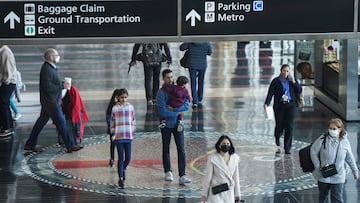How does Biden’s proposed new face mask mandate affect public transport and travel?
The CDC mask mandate for air travel and public transit has been struck down by a Florida judge, a decision which is being appealed by President Biden.


Last week the CDC extended the federal mask mandate on aircraft and public transit.
A few days later, the order was struck down by Florida judge Kathryn Kimball Mizelle. Judge Kimball Mizelle argued that the federal government had overstepped its legal authority in issuing the extension. The Trump-appointed judge rejected the CDC’s use of the “good cause exception” clause, which allows agencies to implement a mandate without making the intention public and giving time for people to provide comments. The Florida judge deemed the use of the clause unlawful, saying “our system does not permit agencies to act unlawfully even in pursuit of desirable ends.’”
The Biden administration has appealed the decision, believing that the move could jeopardize public health. The White House has recognized that, for now, the choice lies with passengers but is “still recommending people wear masks on airplanes.”
The United States is averaging around 69,000 cases a day, meaning that the risk of infection remains high.
Flights and Airports
After the announcement, all major US airlines announced that they would no longer be enforcing the mask mandate, leaving the choice to their customers. However, for those traveling internationally, mandates may still be in place. Before departing it would be best to check what the regulations are at the destination.
Without a mandate, the decision to require masks within an airport lies with leadership at those transit hubs. The vast majority have opted not to enforce their own masks mandates, with the exception of New York’s John F. Kennedy International and La Guardia airports, Philadelphia International Airport, and Los Angeles International Airport.
Trains
Following the aviation industry, the Amtrack rail system also announced that neither employees nor riders would be required to wear a mask on their trains or at stations.
Public Transit
Masking on public transit has been left up to each city.
The San Fransisco-Bay Area BART commuter rail system, New York City, and Los Angeles have stated that masking will still be required.
In Washington DC, leaders have opted to lift restrictions. Defending the action, WMTA General Manager Paul J. Wiedefeld said, “Our mask mandate has been based on federal guidance,” adding that the transit authority would be monitoring the situation. However, the statement seems to conflict with federal guidance, which supports mask mandates for mass-transit systems.
Rideshare
Related stories
Both Lyft and Uber have announced that they will no longer require passengers to wear masks.
In updating its health policy, Uber noted that the “CDC still recommends wearing a mask if you have certain personal risk factors and/or high transmission levels in your area.” If a driver is unwilling to mask, rides can be canceled. The company recommends that customers sanitize their hands before and after a trip and open car windows to allow for better airflow.
You can now ride without a mask and use the front seat if you need to. While mask usage is still recommended, we’ve updated our Covid Safety policies. Let’s move forward, safely together.
— Uber (@Uber) April 19, 2022
For US riders only. pic.twitter.com/LgHYSsC4Bg
Lyft passengers can also cancel their ride, but stated that “health safety reasons – like not wearing a mask – will no longer appear as cancellation options in the app.”

